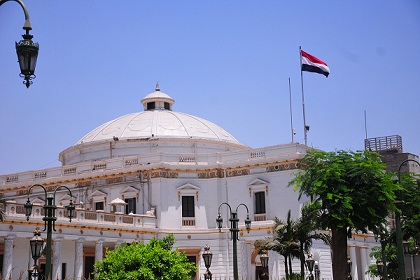Saudi Arabia announced the formation of a 34-state Islamic military coalition Monday to combat terrorism, which raised questions over its motives and implications on the balance of power in the region.
The coalition draws together the Gulf States, Egypt, and Turkey to fight terrorism and will be based in Riyadh “to coordinate and support military operations to fight terrorism”.
“The mentioned countries decided on forming a military alliance led by Saudi Arabia to fight terrorism with a joint operations centre based in Riyadh to coordinate and support military operations,” their statement read.
The announcement referred to the country’s duty “to protect Islamic nations from the evils of all terrorist groups and organisations, whatever their sect and name, that wreak death and corruption on earth and aim to terrorise the innocent”.
The coalition would confront not only the Islamic State (IS) but “any terrorist organisation that appears in front of us,” Saudi Defence Minister and Deputy Crown Prince Mohammed bin Salman said at a press conference in Riyadh.
Retired major general in the Saudi Arabian armed forces, Anwar Eshki, denied any relation between the Islamic coalition and US Secretary of State John Kerry’s calls to combat terrorism.
“This is a separate coalition. They have agreed upon it and got the acceptance of the participating countries before these calls,” Eshki said. “It will not be limited to military operations only; there will be strategic solutions as well”.
Eshki stated that there will be variance amongst the participating countries. Some countries will contribute to the coalition by sending weapons and ammunition, while others will have a military role and will send troops. “Every country will contribute to the coalition based on its capacities but we will decide upon these details later on, when we form the organisational structure of the coalition”.
Iraqi political analyst Mohanad Al-Azzawy described the coalition as “a step on the right path. The coalition creates a balance between the side of Iran, Russia, Syria, Hezbollah, and the rest of the countries”.
With an ever-increasing association between terrorist organisations and the image of Islam, the coalition, which takes a sharp stand against terrorism, aims to separate these two spheres. “It is a strong response to the western accusations of Arabs supporting terrorism,” he said.
The lack of a concrete definition for terrorism that all countries agree upon might be a drawback. However, all 34 countries coming together is a positive step, especially amid the disintegration of Arab societies, according to Al-Azzawy.
Egypt has been suffering intensified terrorist attacks since the ousting of former Islamist president Mohamed Morsi in 2013 and is one of the 34 countries participating in the coalition. Authorities expressed its support for Russia’s call, in August 2015, to create a broad anti-terrorist coalition to fight the Islamic State (IS) and recently called for the formation of a joint Arab Force.
Egypt’s Foreign Ministry spokesperson, Ahmed Abu Zeid, denied any connection between the Islamic coalition and the suggestion to form a joint Arab Force and that the Islamic coalition aims to combat terrorism while the latter would deal with all forms of challenges that threaten Arab security. Egypt supports any efforts taken to combat terrorism, especially if they are Arab or Islamic efforts.
Professor of political science at Cairo University Hassan Nafaa said the Saudi-led coalition is more of a political coalition than a military one. “It is illogical, it is a coalition of Sunni countries against Shi’ite ones,” he said.
The coalition’s goals are to stand against Iran, Syria, and Hezbollah. “It does not represent all Muslims and does not constitute a step forward but deepens the sectarian disagreements,” Nafaa said. Iran is not one of the 34 states participating in the coalition and it is known to be an arch-rival to Saudi Arabia.
The coalition needs to get closer to Iran and the rest of the Islamic countries to be more effective, Nafaa said. Critical about the reason behind forming this coalition at this specific time, he said that it is probably an attempt to eliminate any Arab coalition. “The Arab coalition in Yemen will end after the war ends,” he said.
It is a Saudi attempt to forcefully take control over the Islamic world to rival the rise of Iranian influence in the region.”Saudi Arabia is trying to get all Sunni countries on its side and Iran is coordinating with countries where the majority of citizens are Shi’ite, while the union of the Islamic world seems to be missing,” Nafaa said.
Any step aiming to actually unite the Islamic world will require rapprochement with all Islamic countries, not only the Sunni ones.



